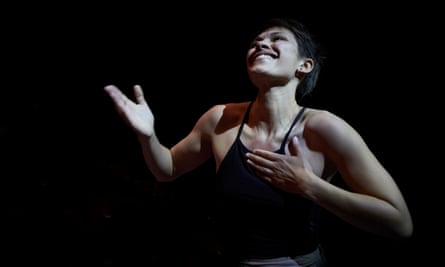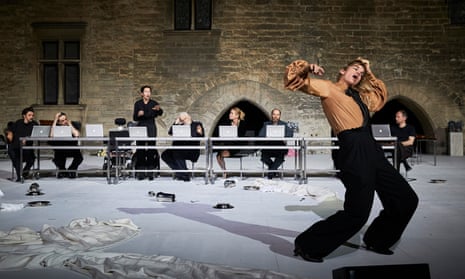‘We are entering a time we had not imagined.” So intone several characters during Pascal Rambert’s vast and flabby Architecture (★★★☆☆), which opens this year’s Avignon festival in the cour d’honneur at Palais des Papes. Rambert – who writes, directs and designs – has his nine characters explore the brutal decline of a turn-of-the-century Viennese Jewish family. The show is posited as a warning of history repeating itself today, and – at four hours long – it is developed in panoramic breadth, each member of the ensemble cast being given a lengthy star turn. Despite the extraordinary talent on view (Emmanuelle Béart, Stanislas Nordey and Denis Podalydès are thrilling), the result is vacuous. The cataclysmic ending – played in a meta-shift to a chummy rehearsal room setting – is a navel-gazing copout after such a lengthy build-up.
Only Pamplemousse, the site’s cat-in-residence, seemed to sense the mood correctly, making a slow diagonal prowl across the vast stage during a quiet scene, puncturing the pomposity and bringing things back down to Earth.

Also focused on history and displacement, Brazilian director Christiane Jatahy’s The Overflowing Present (★★★★★) is in another category altogether, of original, urgent, loving, self-disciplined theatrical genius. Jatahy’s protagonists are real actors who are all experiencing some form of exile. Half of them (from South Africa, Palestine and Lebanon) appear in documentary films on an enormous screen facing the audience beyond a seven-metre no man’s land. The other half mingle among the audience. Jatahy’s premise is that the exile has no place and no time but the present, the past being cut off and the future unknowable.
These exiles tell their own stories using the structure and text of Homer’s Odyssey. Some are trapped in the screen (the excellent Omar Al Sbaai, currently stateless, was unable to come on tour); some are confined to the theatre (Yara Ktaish, who says she was detained as a suspected satanist in her native Syria and fears stepping outside of the show’s tour for visa renewal and potential re-arrest). Belgian scenographer Thomas Walgrave recounts his grandfather’s long march escaping the Nazis and his later return through the horrors of war. Greek-Jewish-Swiss Melina Martin feels by default (and exclusion) “only truly Swiss, but I don’t know what that means.” The state of exile exists, Jatahy implies, in degrees for all of us.
The present and absent performers set up an intricate dialogue through live-filmed and past footage, giving the absent performers strange agency. An uproarious party, seen on screen in Lebanon and also erupting in the theatre, concludes and calms under the stern, closeup screen gaze of a South African girl.
The actors bear witness with professional skill, and perform hauntingly beautiful music by Domenico Lancelotti and Vitor Araújo. Jatahy herself mixes the whole thing in the wings. A major figure of contemporary theatre, she feels under personal threat in Jair Bolsonaro’s Brazil. This extraordinary, vital, funny, deeply moving show allows us to feel that we all, to some degree, share her fear.

Nous, L’Europe, Banquet des Peuples (★★★★☆), directed by Roland Auzet and written by Laurent Gaudé, is a preachy, almost propagandist examination of the European Union through its roots in war, revolution, slavery, colonialism and the upheavals of Prague, Berlin and the Balkans. It seeks to create a renewed positive myth of Europe by facing the continent’s worst hours, and uses sledgehammer techniques such as a thrash metal score (brilliantly performed on voice and guitar by the actor Karoline Rose), big-screen keywords and an enchanting all-ages choir.
Former French president François Hollande was a gasp-inducing deus ex machina on Saturday night, gamely answering the cast’s pointed questions about social justice and his failings in office. Unscripted, he laid a few killer blows, such as: “The climate emergency proves the incongruity of rising nationalisms.” Hollande remained on stage for a bare-breasted bacchanal of the 1968 uprisings.
There is an absent party in all this, though: one actor is admonished for citing 28 member states: “No, 27,” he is waspishly corrected. Nonetheless, the climactic search for a European anthem settles on Hey Jude, raucously na-na-na’ed, even by Hollande, with an accompanying stage invasion. This show is joyous, and who cares if it is primarily making a point? The other, dark side of the argument has crept in everywhere.
Avignon festival runs until 23 July.
